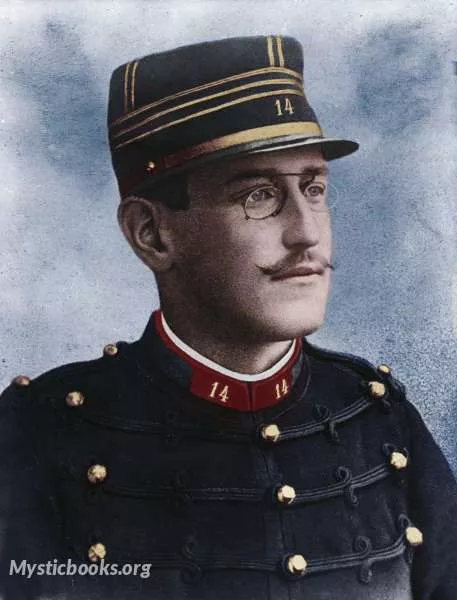
Timeline
Title
Country/Nationality
Alfred Dreyfus
Alfred Dreyfus was a French artillery officer of Jewish ancestry whose trial and conviction in 1894 on charges of treason became one of the most controversial and polarizing political dramas in modern French history. The incident has gone down in history as the Dreyfus Affair, the reverberations from which were felt throughout Europe. It ultimately ended with Dreyfus's complete exoneration.
Born in Mulhouse, Alsace in 1859, Dreyfus was the youngest of nine children born to Raphaël and Jeannette Dreyfus (née Libmann). Raphaël Dreyfus was a prosperous, self-made Jewish textile manufacturer who had started as a peddler. Alfred was 10 years old when the Franco-Prussian War broke out in the summer of 1870, and his family moved to Paris following the annexation of Alsace-Lorraine by Germany after the war.
The childhood experience of seeing his family uprooted by the war with Germany prompted Dreyfus to decide on a career in the military. Following his 18th birthday in October 1877, he enrolled in the elite École Polytechnique military school in Paris, where he received military training and an education in the sciences. In 1880, he graduated and was commissioned as a sub-lieutenant in the French army.
On 18 April 1891, the 31-year-old Dreyfus married 20-year-old Lucie Eugénie Hadamard (1870–1945). They had two children, Pierre (1891–1946) and Jeanne (1893–1981). Three days after the wedding, Dreyfus learned that he had been admitted to the École Supérieure de Guerre or War College. Two years later, he graduated ninth in his class with honorable mention and was immediately designated as a trainee in the French Army's General Staff headquarters, where he would be the only Jewish officer. His father Raphaël died on 13 December 1893.
At the War College examination in 1892, his friends had expected him to do well. However, one of the members of the panel, General Bonnefond, felt that "Jews were not desired" on the staff, and gave Dreyfus poor marks for cote d'amour (French slang: attraction; translatable as likability). Bonnefond's assessment lowered Dreyfus's overall grade; he did the same to another Jewish candidate, Lieutenant Picard. Learning of this injustice, the two officers lodged a protest with the director of the school, General Lebelin de Dionne, who expressed his regret for what had occurred, but said he was powerless to take any steps in the matter.
In 1894, the French Army's counter-intelligence section, led by Lieutenant Colonel Jean Sandherr, became aware that information regarding new artillery parts was being passed to the Germans by a highly placed spy, most likely on the General Staff. Suspicion quickly fell upon Dreyfus, who was arrested for treason on 15 October 1894. On 5 January 1895, Dreyfus was summarily convicted in a secret court martial, publicly stripped of his army rank, and sentenced to life imprisonment on Devil's Island in French Guiana. Following French military custom of the time, Dreyfus was formally degraded (cashiered) by having the rank insignia, buttons and braid cut from his uniform and his sword broken, all in the courtyard of the École Militaire before silent ranks of soldiers, while a large crowd of onlookers shouted abuse from behind railings. Dreyfus cried out: "I swear that I am innocent. I remain worthy of serving in the Army. Long live France! Long live the Army!"
In August 1896, the new chief of French military intelligence, Lieutenant Colonel Georges Picquart, reported to his superiors that he had found evidence to the effect that the real traitor was the Major Ferdinand Walsin Esterhazy. Picquart was silenced by being transferred to the southern desert of Tunisia in November 1896. When reports of an army cover-up and Dreyfus's possible innocence were leaked to the press, a heated debate ensued about anti-Semitism and France's identity as a Catholic nation or a republic founded on equal rights for all citizens. Esterhazy was found not guilty by a secret court martial, before fleeing to England. Following a passionate campaign by Dreyfus's supporters, including leading artists and intellectuals such as Émile Zola, he was given a second trial in 1899 and again declared guilty of treason despite the evidence in favor of his innocence.
However, due to public opinion, Dreyfus was offered and accepted a pardon by President Émile Loubet in 1899 and released from prison; this was a compromise that saved face for the military's mistake. Had Dreyfus refused the pardon, he would have been returned to Devil's Island, a fate he could no longer emotionally cope with; so officially Dreyfus remained a traitor to France, and pointedly remarked upon his release:
The government of the Republic has given me back my freedom. It is nothing for me without my honor.
For two years, until July 1906, he lived in a state of house-arrest with one of his sisters at Carpentras, and later at Cologny.
On 12 July 1906, Dreyfus was officially exonerated by a military commission. The day after his exoneration, he was readmitted into the army with a promotion to the rank of major (Chef d'Escadron). A week later, he was made Knight of the Legion of Honour, and subsequently assigned to command an artillery unit at Vincennes. On 15 October 1906, he was placed in command of another artillery unit at Saint-Denis.
Dreyfus died in Paris aged 75, on 12 July 1935, exactly 29 years after his exoneration. Two days later, his funeral cortège passed the Place de la Concorde through the ranks of troops assembled for the Bastille Day national holiday (14 July 1935). He was interred in the Cimetière du Montparnasse, Paris. The inscription on his tombstone is in Hebrew and French.
Books by Alfred Dreyfus

Five Years of My Life 1894-1899
Alfred Dreyfus, a Jewish captain in the French Army was court martialed in 1894 on a trumped up charge of treason and condemned to life imprisonment on Devil’s island, a penal colony off French Guiana. His prison diary, published as Five Years of My...